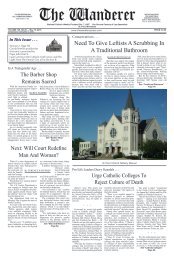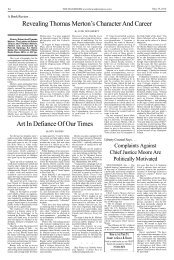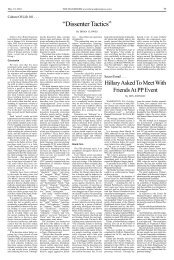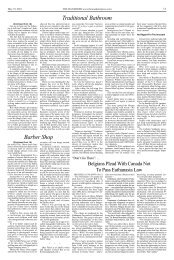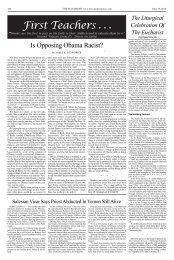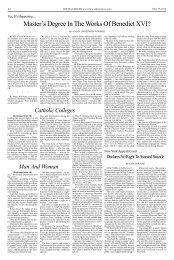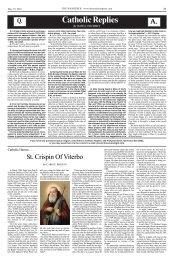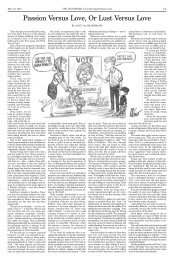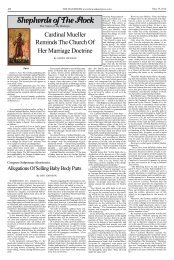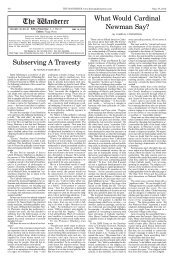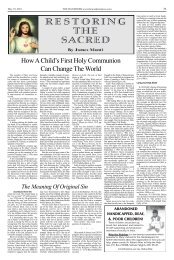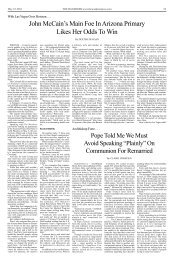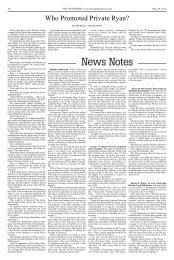You also want an ePaper? Increase the reach of your titles
YUMPU automatically turns print PDFs into web optimized ePapers that Google loves.
SECTION B<br />
LIGHT<br />
FROM THE<br />
ETERNAL CITY<br />
Pope’s Audience . . .<br />
On The<br />
Parable Of The<br />
Prodigal Son<br />
VATICAN CITY (ZENIT) — Here is<br />
a translation of Pope Francis’ weekly<br />
general audience given May 11.<br />
Dear Brothers and Sisters, good morning!<br />
Today, this audience is being held in two<br />
places: as there was the danger of rain, the<br />
sick are in Paul VI Hall and connected with<br />
us with a giant screen — two places but only<br />
one audience. We greet the sick who are in<br />
Paul VI Hall.<br />
Today, we wish to reflect on the parable<br />
of the merciful Father. It speaks of a Father<br />
and his two sons, and it makes us know the<br />
infinite mercy of God.<br />
We begin from the end, that is, from the<br />
joy of the Father’s heart, who says: “Take the<br />
fattened calf and slaughter it. Then let us celebrate<br />
with a feast, because this son of mine<br />
was dead, and has come to life again; he was<br />
lost, and has been found” (Luke 15: vv. 23-<br />
24). With these words the Father interrupted<br />
his younger son at the moment he was confessing<br />
his fault: “I no longer deserve to be<br />
called your son. . . .” (v. 19). However, this<br />
expression is unbearable for the heart of the<br />
Father, who instead hastens to restore to his<br />
son the signs of his dignity: the best robe, the<br />
ring and the shoes.<br />
Jesus does not describe a Father who is<br />
offended and resentful, a Father that, for instance,<br />
says to his son: “you’ll pay for this.”<br />
No, the Father embraces him, awaits him<br />
with love. On the contrary, the only thing<br />
that the Father has at heart is that this son is<br />
before him safe and sound, and this makes<br />
him happy and he celebrates. The welcome<br />
of the son that returns is described in a moving<br />
way. “While he was still a long way off,<br />
his father caught sight of him, and was filled<br />
with compassion. He ran to his son, embraced<br />
him and kissed him.” (v. 20). How<br />
much tenderness; he saw him from afar:<br />
what does this mean? That the Father went<br />
out continually on the terrace to look at the<br />
road and see if his son was returning; that<br />
son who had done just about everything, but<br />
the Father awaited him. How beautiful is the<br />
Father’s tenderness!<br />
The Father’s mercy is overflowing, unconditional,<br />
and it is manifested before the son<br />
speaks. The son certainly knows he has erred<br />
and he acknowledges it: “I have sinned . .<br />
. treat me as one of your hired servants”(v.<br />
19). But these words dissolve in face of the<br />
Father’s forgiveness. His Father’s embrace<br />
and kiss make him understand that he was<br />
always considered son, despite everything.<br />
This teaching of Jesus is important: our condition<br />
of children of God is fruit of the love<br />
of the Father’s heart; it does not depend on<br />
our merits or our actions and, therefore, no<br />
one can take it away, not even the devil! No<br />
one can take away this dignity.<br />
This word of Jesus encourages us never<br />
to despair. I think of mothers and fathers in<br />
apprehension when they see their children<br />
distancing themselves, entering dangerous<br />
ways. I think of parish priests and catechists<br />
who sometimes wonder if their work was in<br />
vain. But I also think of those who are in prison,<br />
and who think that their life has ended;<br />
of all those who have made mistaken choices<br />
and are unable to look at the future; of all<br />
those who hunger for mercy and forgiveness<br />
and believe that they do not merit it. . . . In<br />
whatever situation of life, I must not forget<br />
Continued on 8B<br />
VOLUME 149, NO. 20<br />
THE WANDERER www.thewandererpress.com<br />
Learn Your Faith<br />
The Liturgical Celebration<br />
Of The Eucharist<br />
By DON FIER<br />
Live Your Faith<br />
What Is Faith?. . .<br />
The Meaning Of Original Sin<br />
By RAYMOND<br />
DE SOUZA, KM<br />
As narrated in the Gospels of Matthew,<br />
Mark, and Luke and in the First Letter of St.<br />
Paul to the Corinthians, our Lord Jesus Christ<br />
instituted the Holy Eucharist at the Last Supper<br />
on the night before<br />
He died. Jesus<br />
and His apostles had<br />
just traveled to Jerusalem to celebrate the great<br />
Jewish feast of Passover in commemoration of<br />
the deliverance of the Israelites from slavery<br />
in Egypt.<br />
During the course of the meal, Jesus “took<br />
bread, and when he had given thanks he broke<br />
it and gave it to them, saying, ‘This is my body<br />
which is given for you. Do this in remembrance<br />
of me’” (Luke 22:19). After supper, He<br />
likewise took the cup and gave it to them, saying,<br />
“This cup which is poured out for you is<br />
the new covenant in my blood” (Luke 22:20).<br />
“By this action,” explains Fr. John A. Hardon,<br />
SJ, “Christ gave the Passover its ultimate<br />
meaning and anticipated the final Passover of<br />
the Church in the glory of His kingdom” (The<br />
Faith, p. 118). By instituting<br />
the Eucharist, our<br />
Lord fulfilled words He<br />
had spoken during His<br />
Bread of Life Discourse:<br />
“He who eats my flesh<br />
and drinks my blood has<br />
eternal life, and I will<br />
raise him up at the last day. For my flesh is<br />
food indeed, and my blood is drink indeed. He<br />
who eats my flesh and drinks my blood abides<br />
in me, and I in him” (John 6:54-56).<br />
Moreover, by giving the command, “Do this<br />
in remembrance of me,” our Lord gave the<br />
apostles and their successors, the bishops, the<br />
power to do what He had just done until the<br />
end of time, thereby ensuring the preservation<br />
of the Holy Eucharist in the one, holy, catholic,<br />
and apostolic Church. “The Eucharist,” contin-<br />
Haven’t you met Catholic people who<br />
question the gravity of Adam’s sin? They do<br />
believe that all humans stem from a single<br />
couple, yes, but they find it hard to accept<br />
that stealing an apple is such a big deal. Surely<br />
God could not<br />
be that much offended<br />
by that!<br />
Such people<br />
argue in this manner because they do not<br />
understand the seriousness of original sin.<br />
The fact is that our father Adam committed<br />
a very serious sin. It was very serious for<br />
several reasons:<br />
First, Adam knew perfectly well that<br />
God had warned him of the consequence<br />
of his disobedience: He would die. Period.<br />
“Of the tree of the knowledge of good and<br />
evil you shall not eat, for in the day that<br />
you eat of it you shall die” (Gen. 2:17). And<br />
death here has a double meaning: a) spiritual<br />
death, whereby Adam would lose divine<br />
grace; and b) physical death, whereby<br />
the gift of immortality would be removed<br />
from him.<br />
Part 25<br />
ues Fr. Hardon, thus “became the center of the<br />
Church for the obvious reason that the Eucharist<br />
is Christ” (ibid.).<br />
The Catechism of the Catholic<br />
Church (CCC) now considers<br />
the structure of the Eucharistic<br />
Liturgy as it has been<br />
handed down through the ages.<br />
“As early as the second century<br />
we have the witness of St. Justin<br />
Martyr for the basic lines of the<br />
order of the Eucharistic celebration<br />
. . . [which] have stayed the<br />
same until our own day for all the<br />
great liturgical families” (CCC, n.<br />
1345).<br />
In his description, written around<br />
AD 155, it is easy to recognize the<br />
same fundamental order of the Mass which is<br />
celebrated today in Catholic churches throughout<br />
the world.<br />
The Celebration of the Eucharist, then, “displays<br />
two great parts that form a fundamental<br />
unity” (CCC, n. 1346):<br />
the Liturgy of the Word<br />
which includes the<br />
readings, homily, and<br />
general intercessions;<br />
and the Liturgy of the<br />
Eucharist which includes<br />
the offertory,<br />
consecration, and Holy Communion. These<br />
two components are so intimately linked together<br />
that the Vatican II fathers unequivocally<br />
affirm that “they form but one single act of worship”<br />
(Sacrosanctum Concilium, n. 56).<br />
As elaborated upon by Pope Emeritus Benedict<br />
XVI in his 2007 post-synodal apostolic<br />
exhortation Sacramentum Caritatis, “From<br />
listening to the word of God, faith is born or<br />
strengthened (cf. Romans 10:17); in the Eucharist<br />
the Word made flesh gives himself to us as<br />
All in attendance are encouraged to listen<br />
carefully to the very words of God as<br />
He speaks to us personally through the<br />
writings of the inspired authors of Sacred<br />
Scripture.<br />
Second, the command was easy to obey:<br />
In simple terms, “Just steer clear of the tree,<br />
and you’ll be fine”; the gifts he enjoyed compensated<br />
him by far for having to do such a<br />
simple act of obedience.<br />
Third, there was also an element of bad<br />
will, because Adam was not the victim of<br />
passion or caprice: He acted from cool reason<br />
and on full deliberation, which showed<br />
the calculated malice of his sin.<br />
Fourth, the tempter’s promise was “to be<br />
like God” in the knowledge of good and evil,<br />
so that he might be his<br />
own director and decide<br />
for himself what was good<br />
and what was evil (just<br />
like the moral relativism<br />
of our days). This is a most<br />
important aspect, which<br />
deserves closer scrutiny.<br />
Fifth, he sinned, not as a private individual,<br />
but as the head and representative of the<br />
human race.<br />
Unlike certain liberal politicians and<br />
churchmen today, Adam was not an idiot: He<br />
“Just steer clear of the tree, and<br />
you’ll be fine”; the gifts he enjoyed<br />
compensated him by far for having<br />
to do such a simple act of obedience.<br />
May 19, 2016<br />
our spiritual food. Thus, from the two tables of<br />
the word of God and the Body of Christ, the<br />
Church receives and gives to the faithful the<br />
bread of life. . . . The word of God, read and<br />
proclaimed by the Church in the liturgy, leads<br />
to the Eucharist as to its own connatural end”<br />
(n. 44).<br />
The Catechism now takes us on a brief journey<br />
through the order of the Mass beginning<br />
with the gathering together of the people to<br />
form the eucharistic assembly. Important to<br />
recognize is that “it is the whole community,<br />
the Body of Christ united with its Head, that<br />
celebrates” (CCC, n. 1140). At its head is<br />
Christ Himself, represented by the ordained<br />
minister (priest or bishop) acting in persona<br />
Christi capitis (“in the person of<br />
Christ the Head”), who is the principal<br />
agent of the Eucharist and presides invisibly<br />
over every Eucharistic Celebration.<br />
The Introductory Rite begins with<br />
the Sign of the Cross and the apostolic<br />
greeting of the priest: “The Lord be<br />
with you,” followed by the response:<br />
“And with your spirit.” This response,<br />
which went into effect with the new<br />
translation in late 2011, is reflective<br />
of the scriptural language of St. Paul<br />
(see Gal. 6:18), but even more important<br />
acknowledges the Holy Spirit’s unique activity<br />
through the priest by virtue of his Ordination.<br />
It is followed by the Penitential Rite which<br />
usually includes the Confiteor and Kyrie Eleison,<br />
where we acknowledge our guilt before<br />
God, express our heartfelt repentance, and ask<br />
for an outpouring of His mercy. On Sundays<br />
(except in Advent and Lent) and major feast<br />
days, the tone shifts from sorrowful repentance<br />
to a joyful song of praise to each Person of the<br />
Blessed Trinity in the Gloria. The Introductory<br />
Rite concludes with the Collect, a prayer which<br />
summarizes the intentions of the celebration.<br />
The Liturgy of the Word follows, “which<br />
‘includes the writings of the prophets,’ that is,<br />
the Old Testament, and ‘the memoirs of the<br />
apostles’ [their letters and the Gospels]” (CCC,<br />
n. 1349). All in attendance are encouraged to<br />
listen carefully to the very words of God as He<br />
speaks to us personally through the writings of<br />
the inspired authors of Sacred Scripture.<br />
“For in the sacred books,” teaches the Second<br />
Vatican Council, “the Father who is in<br />
Continued on 6B<br />
knew perfectly well that he was not divine.<br />
He knew that God, His creator and master,<br />
had laid down the rule of law: If you disobey,<br />
you will do evil and be punished by death.<br />
Now, the tempter tells him and his wife that<br />
if they listen to him — the tempter — and<br />
not to God, they will be like God and decide<br />
for themselves what good was and what evil<br />
was. They would be like God.<br />
Adam should have known, also perfectly<br />
well, that by eating a fruit (or whatever it was<br />
that God has forbidden; it does not matter<br />
here) he would definitely not receive divinity.<br />
No apple or any other fruit is so good that<br />
makes you like God just by eating it. So he<br />
believed the word of the tempter; he made an<br />
act of faith in the message of the tempter, and<br />
turned away from the word of God. He sealed<br />
the pact with the tempter by eating the fruit.<br />
In later days, the tempter would make people<br />
sign a contract with their blood in order to receive<br />
the promised gifts.<br />
Here is a most important aspect: Upon<br />
believing the word of the tempter, and abandoning<br />
God’s word, didn’t Adam commit a<br />
sin of Satanism? That is what Satanists do:<br />
They believe in the promises of the tempter<br />
and turn away<br />
from God in order<br />
to receive the gifts<br />
promised by the<br />
tempter. And they<br />
fall flat on their<br />
faces in a hot place,<br />
because the Devil,<br />
being the Father of Lies, does not give what<br />
he promises.<br />
Now, here is the mystery: Why did he do it?<br />
Especially since he knew perfectly well that it<br />
Continued on 3B<br />
Help spread the Catholic Faith, pass this to a friend who might benefit.



